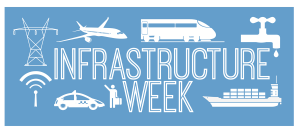Communicating Value to Consumers: Strategies for Water and Sewer Utilities
 How do you communicate with ratepayers so you have a relationship, they support what you’re trying to do and understand the need to pay for it, especially when you need to raise rates for a big new upgrade? How can you raise awareness of your organization and make it look good? How do you leverage media relationships? And what kinds of staff and resources does your organization need in order to do this successfully?
How do you communicate with ratepayers so you have a relationship, they support what you’re trying to do and understand the need to pay for it, especially when you need to raise rates for a big new upgrade? How can you raise awareness of your organization and make it look good? How do you leverage media relationships? And what kinds of staff and resources does your organization need in order to do this successfully?
In this webinar, presented in conjunction with The Brookings Institution’s Infrastructure Week, speakers highlight the importance of developing a strong public-facing communications strategy, discuss the capacities that permittee organizations will need in order to execute a communications strategy well, and offer some strategies for taking full advantage of the media.
Agenda
- Introduction and overview of the state of urban water infrastructure in New Jersey, including CSOs, and why communications is more important than ever | Presentation
- Case study 1: How the Atlantic County Utilities Authority turned itself inside-out to become relentlessly consumer focused | Presentation
- Case study 2: How Philadelphia Water’s Green City, Clean Waters initiative manages its public engagement | Presentation
- Working with the media to get your story out | Presentation
- Q&A and conclusion
Presenters:
Elaine Clisham
Elaine is responsible for communications and engagement across all media between New Jersey Future and its constituencies. Prior to joining the organization in March 2011, she spent more than 30 years in advertising sales and marketing at several New Jersey newspaper organizations and at its statewide trade association. Most recently she was the director of marketing and of targeted solutions at the American Press Institute, a national newspaper industry think tank, where she was involved in a multi-year research project focused on new digital business models for newspapers.
Richard S. Dovey
Rick Dovey is president of the Atlantic County Utilities Authority (ACUA), a position he has held since 1990. During his tenure as president, ACUA wastewater and solid waste operations have been nationally recognized for excellence in innovation, efficiency, and environmental stewardship. Prior to joining the ACUA, he served as department head of regional planning and development for Atlantic County and manager of the Rutland County, Vermont, Solid Waste District. A leader in the New Jersey environmental infrastructure and utility community, Mr. Dovey has served as chairman of the New Jersey Solid Waste Advisory Council and as president of the Association of Environmental Authorities of New Jersey.
Tiffany Ledesma
Tiffany Ledesma is a public engagement specialist who has spent more than 12 years working with the Philadelphia Water Department, first with the Office of Watersheds and now with the Public Affairs Division. Tiffany leads the public engagement team, which focuses on public participation initiatives, partnership-building and strategic communications that help advance PWD’s infrastructure investments to build healthier waterways. These initiatives include Green City, Clean Waters, Philadelphia’s innovative and environmentally sustainable plan that is setting a national standard for stormwater management.
Elizabeth Ruebman
Elizabeth is the executive vice president of Amplify, Inc., a mission-driven public affairs organization. Her background is in government affairs, communications, and community outreach. Recently at Amplify, she directed the Center for Collaborative Change’s Best Practices Summit on Community-Police Relations, which brought to Newark information on proven and promising practices for improving relations and trust between the community and Newark police. Previously she was policy and communications Manager with NY/NJ Baykeeper, where she led its combined-sewer overflow campaign. She is also a founding member of the Newark DIG steering committee.Elizabeth spent more than 10 years as a federal lobbyist working on such issues as criminal justice and welfare, with a focus on local government affairs.











